I'll See You In The Movies
A diary of my week searching for Wayne Shorter's spirit in Los Angeles
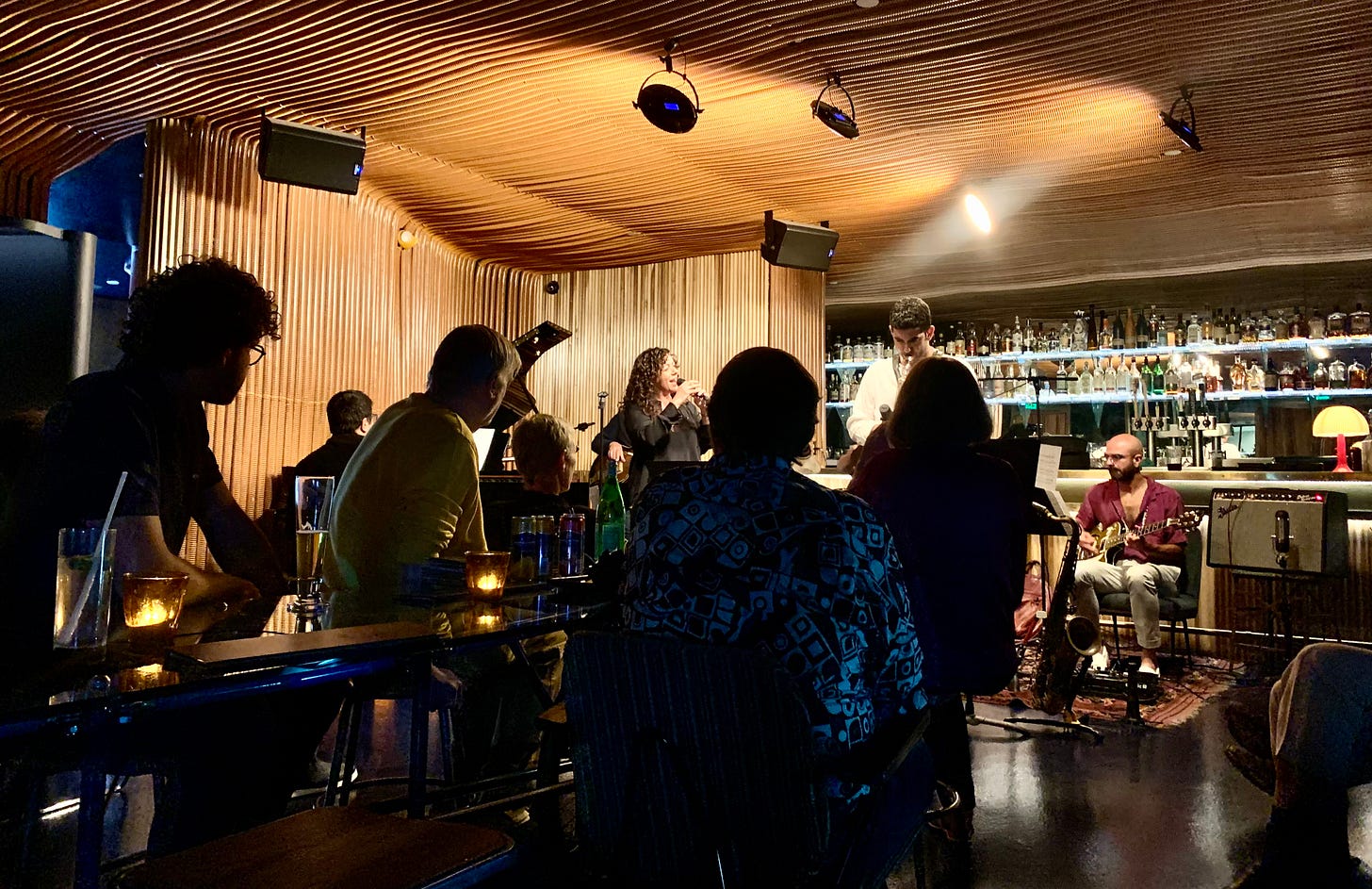
How’s the end of summer treating you? I hope you’ll indulge one more post about Wayne Shorter before we move on to some other topics. Writing this essay was important to me.
Last week we celebrated Wayne in Los Angeles with a series of events. On my short flight from Denver to L.A., memories of him glissandoed through my mind. Dozens of Wayne’s idiosyncratic quotes or “Wayneisms” floated into my consciousness. As I was flying, this naturally came to me:
Just like it takes resistance for an airplane to take off, we find a way to make resistance into fuel. We turn poison into medicine.
An old friend texted, “Remember when Wayne would face the wall on the elevator?” A little slapstick routine on the way up to his Miami high-rise condo, where I often worked with him on my book Footprints in the early aughts.
“It’ll be good, even healing, to spend time with people who knew and loved Wayne,” I told friends in advance of my trip. This was true.
In retrospect, I can see that I was also expecting these memorial events to somehow conjure Wayne’s presence. I anticipated all those friends and family willing his singular spirit into existence. It wasn’t exactly realistic. Here’s how I found Wayne’s presence again, but not where I expected.
I arrived in L.A. just in time for Herbie Hancock’s all-star “Celebrating Wayne” tribute concert at the Hollywood Bowl. Carlos and Cindy Blackman Santana, Joni Mitchell, Kamasi Washington, and many other special guests gave virtuosic performances. For a full account, please read this comprehensive review by George Varga. Or check out Nate Chinen’s assessment of the tribute show alongside the new Wayne documentary, Zero Gravity. Read both if you like.
Okay, maybe I’ll tell you about my favorite moment at the Hollywood Bowl concert.
A collective gasp from the front rows was my clue that Joni Mitchell had taken the stage. A wave of surprise then flowed back through the audience. There was euphoria, disbelief, and gratitude in the crowd’s extraordinary response to Joni’s appearance.
Like many in the crowd, my friend Rebecca was laughing and crying at the same time. I thought of some lines from Joni’s song “People’s Parties”:
Saying, laughing and crying
You know it's the same release
Those of you who read my earlier Substack post on Joni might understand why I was thrilled to see her perform "The Circle Game" at the Bowl among sensitive players who gave her the space and support to be herself. This meant a lot to me since she and Wayne enjoyed many decades of playing together in one of the most intuitive and beautiful partnerships music has ever known.
A video of Joni’s performance:
Personnel: Terri Lyne Carrington & Brian Blade, percussion; John Patittucci, bass; Lionel Loueke, guitar; Chris Potter, saxophone; Herbie Hancock, piano.
As a woman seated behind me said, "Now my girl is back."
A private memorial was held the following night in Santa Monica. Wayne’s wife Carolina endeavored to include everyone who collaborated with Wayne in his long, varied creative life. Among other things, Wayne’s memorial was the jazz musician hang of the year, with so many notable figures in attendance that it would be easier to list who wasn’t there.
Unanticipated guests were also a delight. I met the accomplished film composer Joseph Vitarelli, who co-wrote “Endangered Species” with Wayne in 1985. Joseph told me he and his wife “ran with” Wayne and his second wife Ana Maria in the high-flying 80s.
Meanwhile, a couple of rows ahead, Wayne’s former sister-in-law Maria Lucien was loudly regaling Joni Mitchell with a story about Tina Turner. It was a scene.
Wayne was a devout Buddhist. This was a Sokka Gakkai International memorial service, so chanting was featured, though the traditional incense offering was omitted due to the non-Buddhists in attendance. Of all Wayne’s Buddhist wisdom, perhaps the most accessible was his capacity to turn challenges into opportunities and poison into medicine. For all his painful loss, Wayne never developed emotional scars, and never let prolonged sadness or struggle overwhelm his ability to tap into his childlike imagination.
It was poignant and funny when Carolina Shorter spoke of Wayne’s approach to challenges on tour. She told a story about an instance in remote Pori, Finland when Wayne’s saxophones didn’t make it through the airline snarl to the gig. A local music teacher produced a loaner, which turned out to be an odd frosted green instrument. Onstage that night, Wayne didn’t acknowledge this bizarre substitute horn at all. He just played it, working with the conditions the night presented.
In what must have been a surprise to many in the audience, Carolina also briefly joined bassist esperanza spalding, drummer Terri Lyne Carrington, and pianist Leo Genovese onstage to sing Wayne’s tune “When You Dream” from his Atlantis album. (Danilo Perez’s daughter also made a singing cameo). Carolina was an accomplished actress and singer back in Brazil. She has an extraordinary voice, deep, full, and rich, as if she’s carrying the Amazon River itself into song. Wayne always encouraged Carolina to sing more—this was one of his final directives to her before his transition.
Here’s a video of Carolina performing with the women’s choir Brazilian Voices in 2005. She’s out front in white.
The final memorial performance was by Danilo Perez, John Patittucci, and Brian Blade, Wayne’s quartet members of two decades who now perform as the trio Children of the Light.
First, the trio spoke. Brian Blade’s scripture quote moved me more than anything:
“If I speak in the tongues of men or of angels, but do not have love, I am only a resounding gong or a clanging cymbal,” Brian said. “And Wayne had love,” he testified, much as I imagine his father Pastor Brady L. Blade Sr. did at the Shreveport Zion Baptist Church where Brian came up.
When John Patittucci referenced Wayne’s beloved impression of Walter Brennan in the 1941 film Swamp Thing (“I’ve been bitten by a water moccasin 27 times and I ain’t dead yet!”), I saw Joni Mitchell excitedly elbow her friends. As she once told me, this Brennan water moccasin bit was Wayne’s greeting for her when they first met to record in London. Throughout the memorial, Joni lit up at any Wayneism she knew and loved. Her ongoing recovery may have leaped forward at this memorial.
The Children of the Light trio performed a free-flowing exploration of classical motifs, a reverie that teased a few Wayne melodies. As they played, Joni danced in her seat. A native dancer among so many in that room, remembering Wayne.
Non-Stop Home
Wayne always said he felt most at home in Los Angeles. Maybe it came down to his love of movies. From the intersection of his film fandom and his Buddhist practice came this advice: You are the director, producer, and actor in the movie of your own life.
Those of us who were close to Wayne know he also wanted to discuss the movies of our everyday lives. No one was a better conversationalist than Wayne. Giving himself over to the moment so radically enabled extraordinary wordplay, comedy, and warmth.
So, in L.A. I would have talked with Wayne about power walking Beachwood Canyon under the Hollywood sign. I would have shared the scene I witnessed last week at Beachwood Cafe, where the old Hollywood industry types who’ve long populated the neighborhood are being overrun by Harry Styles fans. These young fans are drawn to the place by a brief mention in one of the pop star’s lyrics (“And the coffee's out/At the Beachwood Cafe”) and want to photograph themselves eating what Harry did at the cafe (Eggs Benedict).
At lunch there I saw a smartphone-absorbed, mini-skirted teenager bump into the table of an aging and probably striking screenwriter who was working on his laptop. The screenwriter’s Arnold Palmer sloshed out onto the table.
Wayne would have had some unique spin on the cafe’s modern mash-up, some unusual perspective on the generational and cultural conflict at play there. I miss hearing his take on things.
We know what we value in this world by what we want for our children. I wish my son could have grown up to know Wayne as I did.
“Play More Me Than Him”
Wayne’s luminous 1975 album Native Dancer with Milton Nascimento has special meaning for me, as it does for many musicians and fans. When I was researching my book Footprints, I found little info on the making of the album, so I devoted extra time and space to reporting and crafting its story.
In 2003 I went to Rio to interview Milton Nascimento and other Native Dancer musicians. As Milton and I were talking at his coastal home, I said, "This interview is great, but I feel like I need to see where you came from. Where your extraordinary voice comes from."
“When can you be ready to go?” Milton asked.
The next morning Milton's driver picked me up at my Rio hotel. That afternoon I found myself in Milton’s hometown of Tres Pontas, Minas Gerais, where his biographer Maria Dolores showed me around for a couple of days, introducing me to various townsfolk who’d known Milton and deepening my understanding of him considerably.
This was the advantage of working so closely with Wayne on the book. When I began it in 2002, he’d never authorized anyone to write his story before, so his friends and collaborators went out of their way to inform, assist, and enlighten. Anything for Wayne, they said.
Last week’s Native Dancer tribute at L.A.’s Sam First club was something I couldn’t miss, especially when it involved two of my favorite musicians, bassist Larry Klein and vocalist Luciana Souza, who themselves knew Wayne well. Also on the bill were a couple of Wayne’s former Monk Institute students, saxophonist Daniel Rotem and drummer Christian Euman. Guitarist Marcel Carmago and pianist Otmaro Ruiz rounded out the group.
I walked into a club animated by what Wayne loved: the sound of spoken Portuguese and the vibrancy of Brazilians. Wayne’s second wife Ana Maria was Portuguese and a connoisseur of Brazilian music; she urged him to make Native Dancer with Milton. The club felt a little like Wayne’s home, where his wife Carolina and her Brazilian friends all seem to practice happiness as a discipline.
The band started with Wayne’s instrumental tune “Beauty and the Beast.” On soprano sax, Daniel Rotem gestured at Wayne’s familiar solos while also departing from those lines, making the music his own.
I only managed to get a brief clip of him playing the melody here:
Later Daniel messaged me this: “While I tried to do my utmost to pay respect and love to Wayne and his music I had the strong feeling that if it was up to Wayne, he’d say that I should ‘play more me than him’.”
Luciana Souza joined the instrumentalists onstage and delivered an insightful introduction to Native Dancer. Along with celebrating Wayne, she said, they were paying homage to how the album had liberated Milton Nascimento, making him a “jazz cat.”
Play music for the world you want to create, Wayne often advised. That’s what they did. As the musicians performed songs from Native Dancer, they regularly opened up space for free improv, working the sound of surprise into the music. They made the most of Wayne and Milton’s tunes, both of them composers of melodies so appealing that you could almost forget their music’s underlying harmonic sophistication.
The urge to venerate can be strong with a charismatic spiritual figure and towering artistic genius like Wayne. Yet solemnity and adulation don’t suit him or his legacy. He often used levity to bring home any heavy wisdom he shared. Revering Wayne as a sacred genius locks the focus on him, when he worked to help people look inward, unlocking deeper parts of themselves in both music and life.
This Native Dancer tribute brought Wayne down from his pedestal and into the room among us. These musicians played more themselves than Wayne because that honored him best.
Beside me in the audience a Brazilian woman sang along with Luciana, sometimes drowning her out. I adore this Brazilian tendency to out-sing performers for the sheer love of live music.
I had a feeling about this woman.
“Are you friends with Wayne and Carolina?” I asked.
“Very good friends!” she said. “I made the spaghetti sauce Wayne requested at the end of his life.”
The next day Carolina would confirm that this was Vera, or “Verinha,” as Wayne called her, in diminutive endearment. I’d heard about her. An old friend and gifted chef who made a slamming Bolognese sauce that Wayne requested for his 80th birthday and other special occasions. When Vera gave me a hug of life there in the club, she felt like an old friend of mine, too.
Onstage, saxophonist Daniel Rotem paused the music to tell a story about a day at the Monk Institute when the Zero Gravity documentary crew shot some footage. “I encourage you all to see the documentary,” he said, and then proceeded with his tale.
Before the film crew arrived that day, Wayne handed the Monk Institute students a new piece of his music carefully notated, as always, in his precise hand. The students and Wayne played through the music until someone interrupted them to say the crew was waiting outside.
“Shhhhhh,” Wayne said. He collected the sheet music and put it away. The film crew entered the room with their equipment. None of the students ever saw or heard that piece of music again.
As the musicians at Sam First launched their final Native Dancer tune, Milton’s “Lilia,” I felt a profound happiness. Here in this casual setting, Wayne the innovator was celebrated with a wild, joyful adaptation of his music wholly in the spirit of his own. Here the divine sage was also a human being who kept secrets and loved a great Bolognese. I had finally found what I’d been looking for in Wayne’s celebration week.
It was all happening on what would have been Wayne’s 90th birthday at a club nestled up against the airport, where planes that need resistance to fly would take us Wayne celebrants back to our various homes.
We carry his example of sustaining the heart and humor to accept challenges as opportunities for growth. We carry the possibility of moving through the world with curiosity, imagination, and joy, like him.
His music gives us everything else we need.
As Wayne loved to say, I’ll see you in the movies.





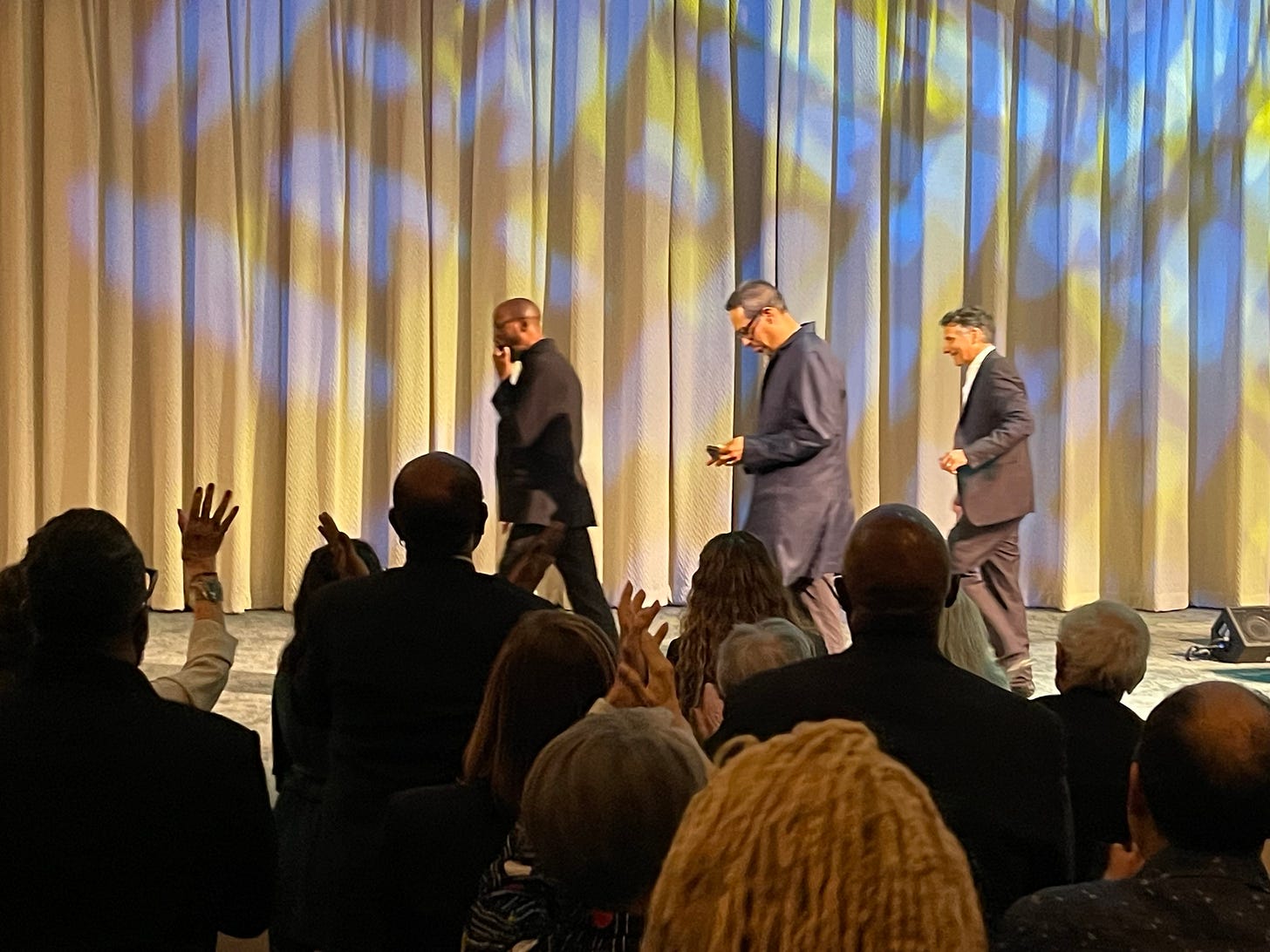
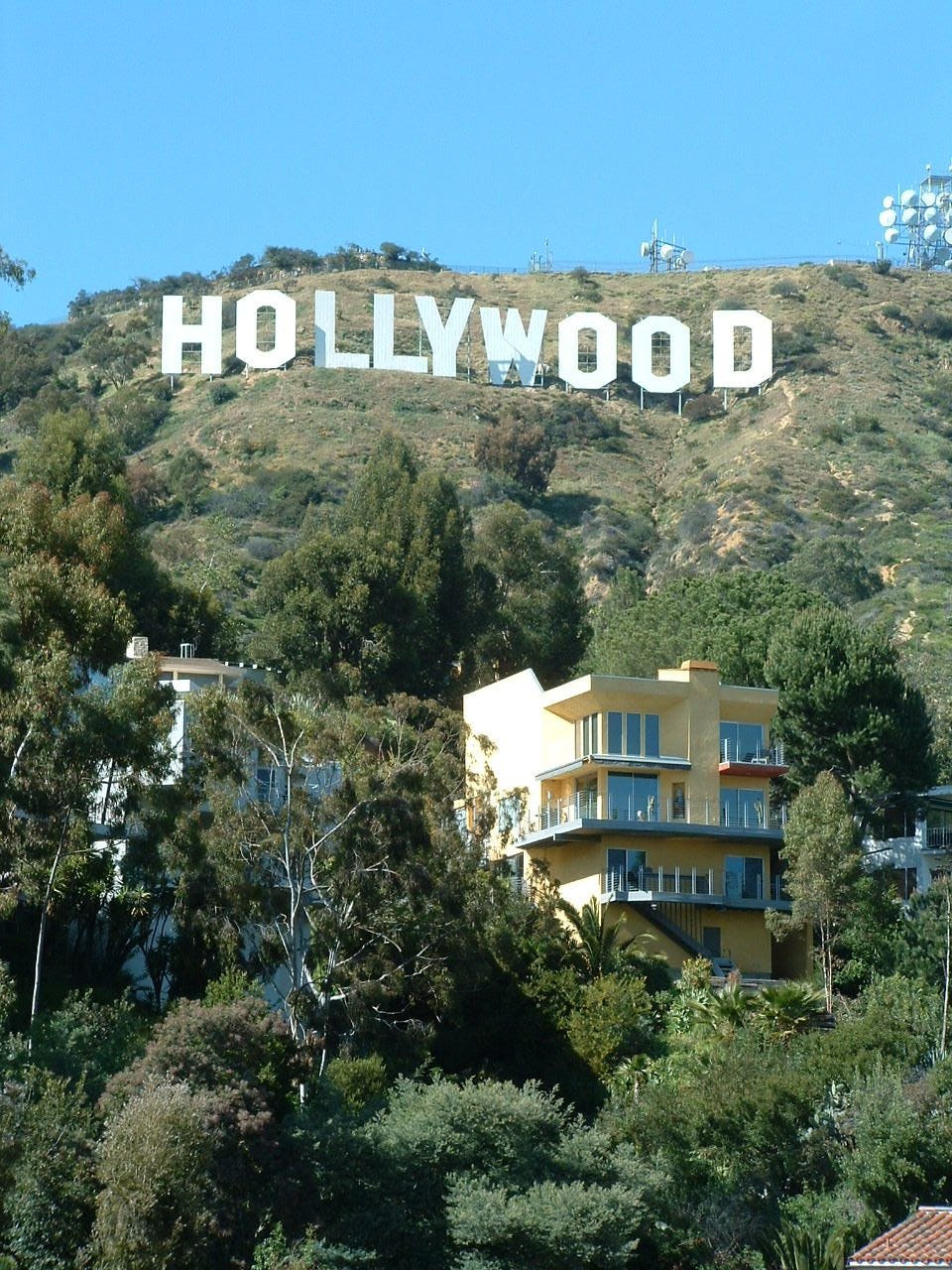
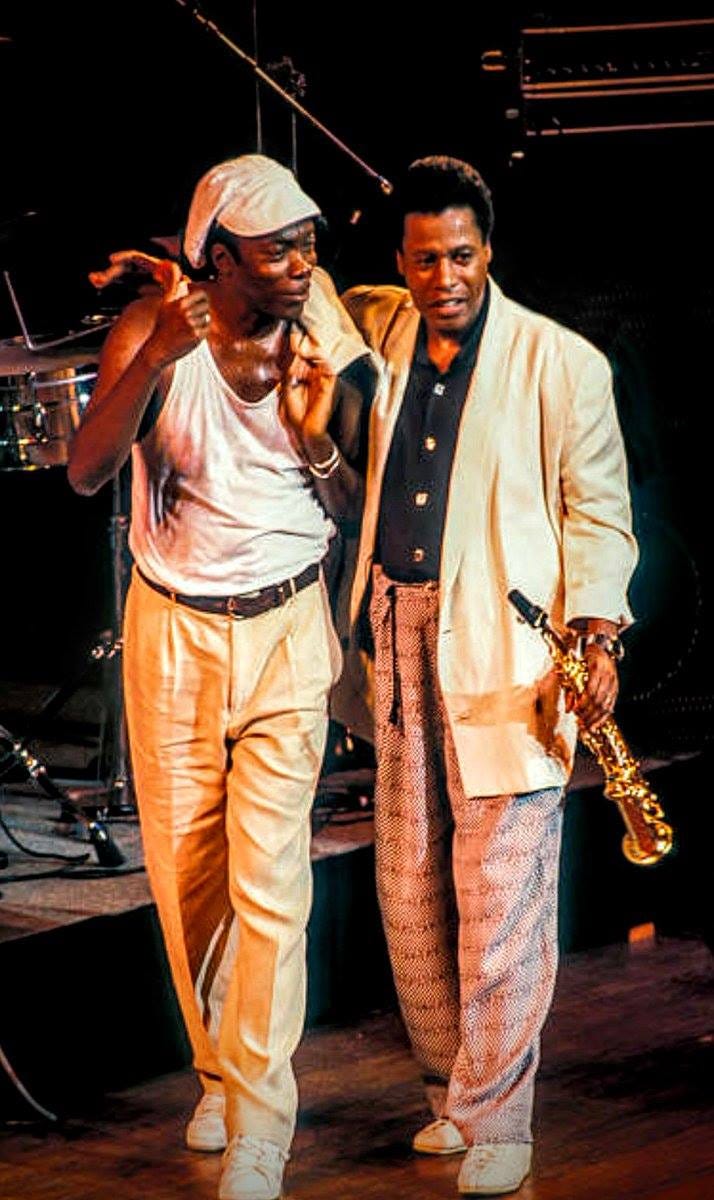
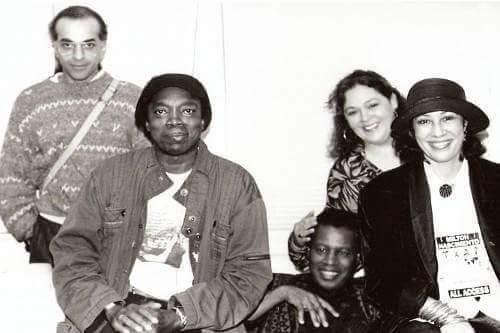
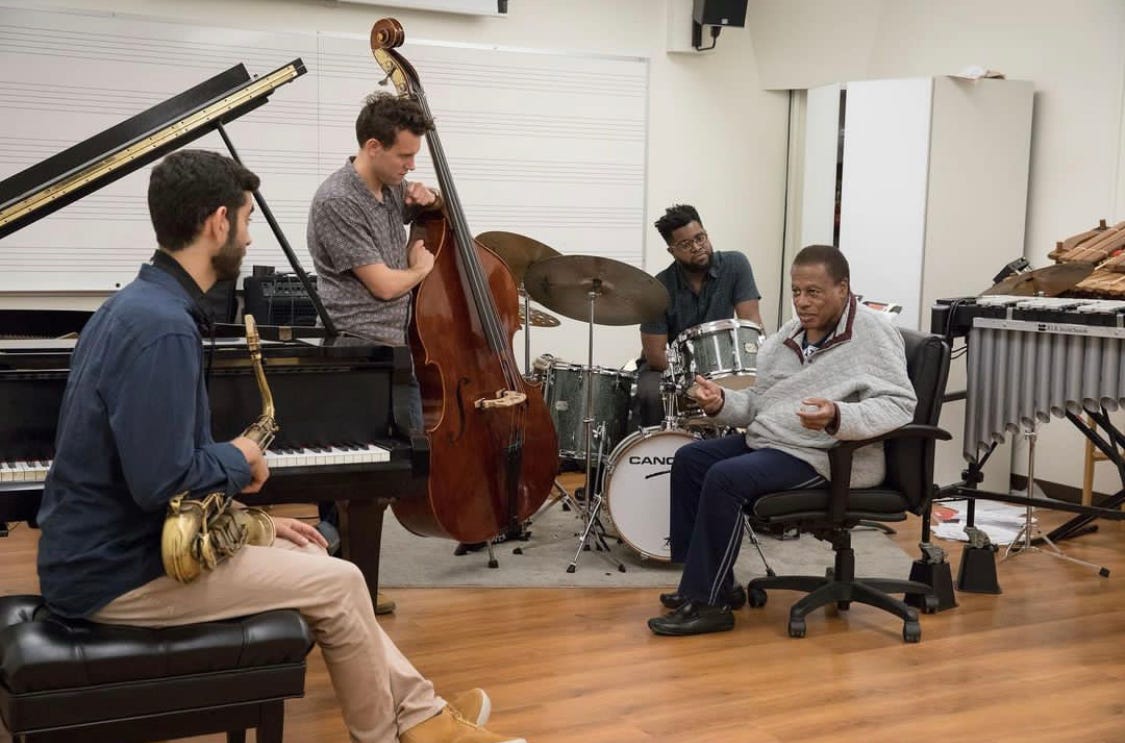
Thanks so much for posting this Michelle! I had been looking forward with much anticipation to reading your impressions of the various tributes to Wayne Shorter and as always your writing did not disappoint. You have a unique perspective on his life and I - undoubtedly along with many others - am grateful you shared your experiences in L.A. with us!
Beautiful, Michelle, just beautiful. My words cannot do justice to your words and to Wayne Shorter who's been a musical presence in my (listening, waking, and dreaming) since his time with Miles Davis. Thanks for sharing!!